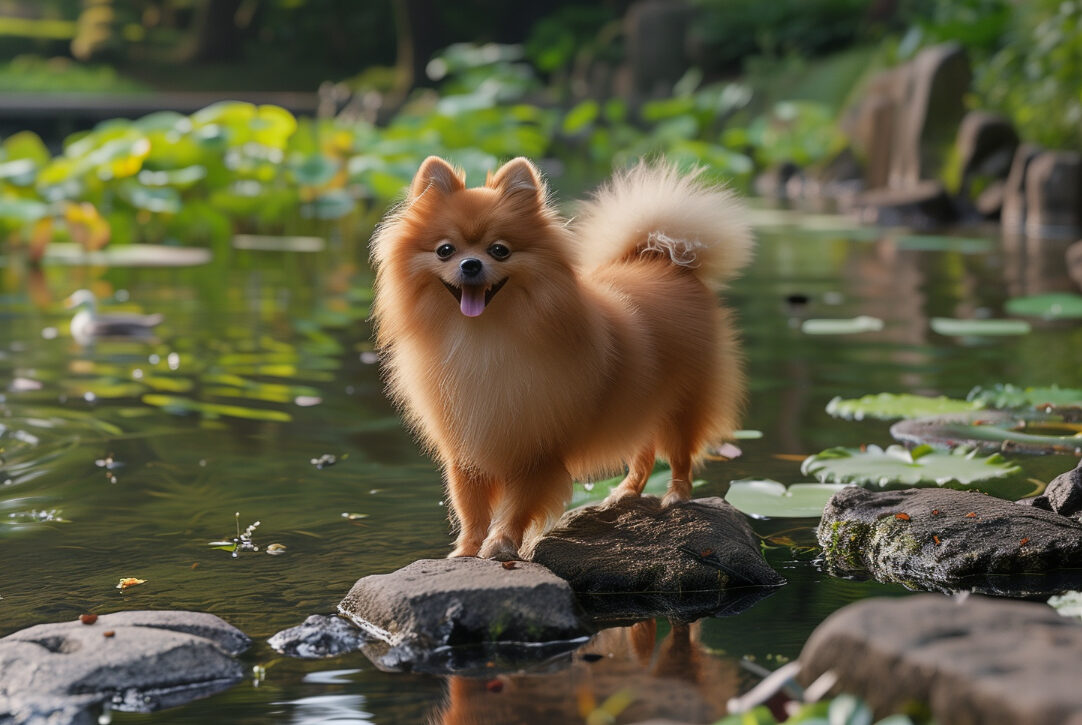Are Pomeranians Hypoallergenic?
Pomeranians and allergies
Are Pomeranians hypoallergenic? Unfortunately, Pomeranians are not hypoallergenic, but with the right care, allergy sufferers can still enjoy their companionship. Due to their thick double coat, they shed regularly, especially during seasonal changes. This shedding increases the amount of dander in the home, which can trigger allergic reactions. In addition, Pomeranians may shed more than other small breeds, spreading more allergens around your living space.
Who is most likely to experience allergies?
If you have a history of allergies, especially to pet dander, it’s possible that you’ll have a reaction to a Pomeranian. People with asthma or severe respiratory sensitivities may find that living with a Pomeranian aggravates their symptoms, making it more challenging to manage day-to-day life. However, some people with mild allergies may still be able to live comfortably with a Pomeranian, especially if they take steps to reduce allergens in the home.
Pomeranian Allergy Symptoms
What are common allergy symptoms in humans?
Dog allergies are fairly common and can manifest in several ways. Common symptoms include:
- Sneezing and a runny or stuffy nose
- Watery or itchy eyes
- Coughing or shortness of breath
- Skin rashes or hives
- Asthma attacks in severe cases
These symptoms can range from mild to severe and often worsen with prolonged exposure to the allergen.
Why do Pomeranians cause allergies?
While Pomeranians are admired for their double-layered fluffy coat, the reality is that they produce dander.
Dander is made up of tiny flakes of skin that animals shed regularly, and this is what often triggers allergic reactions in humans. Additionally, proteins found in a dog’s saliva and urine can also cause allergic symptoms. Pomeranians, like all dogs, produce these proteins, and because they are constantly grooming themselves, saliva can get onto their fur, which sheds around the home.
The ACAAI provides a comprehensive overview of pet allergies, “Contrary to popular belief, there are no ‘non-allergenic’ dogs. All dogs have skin flakes, saliva, and urine, which can spread allergens.
Recognize if you’re allergic to a Pomeranian
If you’re allergic to dogs, you’ll notice symptoms like sneezing, itchy eyes, or a scratchy throat after being around a Pomeranian. Allergies may occur within minutes of contact or after a few hours of exposure.
If you’re unsure whether you’re allergic to dogs, it may be worth spending time with a Pomeranian before adopting to see if any symptoms arise.
Pomeranian Hypoallergenic Puppies: Myth or Reality
Some people believe that puppies are less likely to trigger allergies, but this is a myth. Pomeranian puppies, like adult Pomeranians, produce dander and allergens from the start. While they may shed less initially because they haven’t fully developed their adult coats, they still release allergens into their environment through their saliva, skin, and fur.
Caring for a Pomeranian puppy if you have allergies:
If you’re set on owning a Pomeranian puppy despite your allergies, there are several steps you can take to minimize allergic reactions:
- Regular grooming: Brushing your puppy several times a week and bathing them every month can reduce shedding and remove dander.
- Air purifiers: Using a HEPA air purifier in your home can help filter out allergens in the air, reducing the concentration of dander.
- Frequent cleaning: Vacuuming regularly, washing your dog’s bedding, and keeping surfaces clean will limit the buildup of allergens in your home.
- Designated pet-free zones: Consider making certain rooms in your home (like your bedroom) off-limits to your dog to reduce exposure to allergens while you sleep.
Are Pomeranian Mixes Hypoallergenic?
What are hypoallergenic dogs?
When people say a dog is hypoallergenic, they usually mean the dog is less likely to cause an allergic reaction. Hypoallergenic dogs typically shed less fur and produce less dander. Breeds like Poodles, Bichon Frises, and Schnauzers are often considered hypoallergenic because their coats trap dander instead of releasing it into the environment.
Pomeranian mixes and hypoallergenic traits:
Pomeranians are often crossbred with other small dogs, like Poodles (Pomapoos) or Chihuahuas (Pomchis). While mixing a Pomeranian with a hypoallergenic breed may reduce the shedding and dander to some extent. It doesn’t guarantee that the resulting mix will be hypoallergenic.
For example, a Pomapoo (Pomeranian and Poodle mix) may inherit more of the Poodle’s hypoallergenic coat, but they may still shed or produce allergens like a Pomeranian. It’s important to remember that the hypoallergenic trait is not guaranteed in mixed breeds.
Are Teacup Pomeranians Hypoallergenic?
What are Teacup Pomeranians?
Teacup Pomeranians are a smaller version of the standard Pomeranian, typically weighing less than 4 pounds. They are popular because of their tiny size and cute appearance, but they still have the same characteristics as regular Pomeranians, including their fluffy coats.
Do their small size make them hypoallergenic?
Despite their smaller size, Teacup Pomeranians are not hypoallergenic. Even though they may seem like a better option due to their reduced body mass, they still shed and produce dander just like regular Pomeranians. While a Teacup Pomeranian may produce less dander because of its size, it’s still enough to trigger allergic reactions in sensitive individuals.
Conclusion
In conclusion, while Pomeranians are a delightful breed, they are not hypoallergenic. Both Pomeranians and their mixes can cause allergic reactions in sensitive individuals due to the dander and proteins they produce.
However, if you suffer from mild allergies, it may still be possible to live comfortably with a Pomeranian by adopting regular grooming habits and keeping your home clean.
Owning a Pomeranian doesn’t have to be off-limits if you take steps to manage allergens effectively!




0 Comment